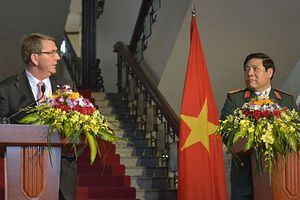After Vietnam’s initial outrage at the Chinese deployment of the Haiyang Shiyou 981 (HYSY 981) oil rig near the Paracel Islands within Vietnam’s exclusive economic zone in 2014, the country has largely taken a back seat in the various protests against China. In doing so, it now appears Vietnam stands to benefit from the competing interests of the superpowers vying for control of the South China Sea.
Tensions have always existed between China and its neighbors, but the oil rig kicked off a new era in the region’s territorial disputes. The HYSY 981 oil rig was one of the first physical acts demonstrating a new Chinese maritime assertiveness in the South China Sea. This has spurred a number of players to respond.
U.S. President Barack Obama will visit Vietnam this week. The country is a key U.S. trading partner in the Southeast Asian region, but this visit is much more about combating China’s increasingly forceful territorial claims than it is about economics. Both Vietnam and the United States can mutually benefit from this visit. Vietnam would like Washington to lift the embargo on arms sales, allowing it to quickly modernize its military and air force in the face of its overbearing neighbor, while the U.S. Navy would like regular access to Cam Ranh Bay, one of Indochina’s eastern-most ports, a short distance from the hotly contested Spratly and Paracel Islands (known as Truong Sa and Hoang Sa in Vietnam respectively). It is reported Russia has also requested regular access to this port.
China is not happy about the U.S. president’s visit. It has stepped up its own diplomatic efforts ahead of Obama’s visit. The Chinese ambassador in Hanoi, Hong Xiaoyong, paid a visit to Vietnam’s Defense Minister Ngo Xuan Lich on Thursday. In a pre-emptive attempt at showing solidarity, Hong announced that the two communist countries agreed to strengthen military cooperation, according to Xinhua, China’s state-run news agency.
However, given the territorial disputes of recent years, with the most recent in January 2016, it is hard to comprehend Vietnam agreeing to this position on any terms other than purely in principle.
Since the oil rig incident, the Vietnamese government’s own actions have suggested that it supports the United States’ recent activities in the region. In January, the Vietnamese government quietly observed the USS Curtis Wilbur’s freedom of navigation operation in the portion of South China Sea (also referred to as East Sea in Vietnam) within its territorial waters. More explicitly, Le Hai Binh, the Vietnamese foreign ministry spokesperson, released a statement in response to the Tribunal in the arbitration instituted by the Philippines against China stating:
First and foremost, I would like to reaffirm Vietnam’s indisputable sovereignty over the Hoang Sa and Truong Sa Archipelagos… Regarding the Arbitration instituted by the Philippines, Vietnam has on multiple occasions expressed its view… Vietnam continues to keep a close watch on the progress of this case and reserves its right to use all necessary and appropriate peaceful means to protect its rights and legal interests in the East Sea.
Obama, who arrives on Monday, will visit the capital Hanoi and Ho Chi Minh City. He will meet Vietnam’s new president, Tran Dai Quang, new prime minister, Nguyen Xuan Phuc, as well as Communist Party General Secretary Nguyen Phu Trong. The U.S. administration has not yet revealed if it will completely lift the four-decade long arms embargo, largely due to concerns over Vietnam’s human rights record. Regardless, both the U.S. and Vietnam expect greater levels of military cooperation, to the chagrin of China.

































